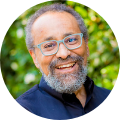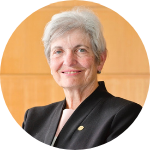|
ABOUT THE PARTICIPANTS
|
 |
Christopher Edley, Jr., is co-founder and president emeritus at the Opportunity Institute. He is also the Honorable William H. Orrick, Jr., Distinguished Professor of Law at the University of California, Berkeley, School of Law, after serving as dean from 2004 through 2013. Before Berkeley, Edley was a professor at Harvard Law School for 23 years, where Gary Orfield and he co-founded the Harvard Civil Rights Project. Edley co-chaired the congressionally chartered National Commission on Education Equity and Excellence (2011-13). He served in White House policy and budget positions under presidents Jimmy Carter and Bill Clinton. Edley also held senior positions in five presidential campaigns.
|
 |
Nancy Gonzales is dean of natural sciences, Foundation Professor of Psychology, and co-director of the REACH Institute at Arizona State University. Her research examines culturally-informed models of resilience and strategies to achieve equitable education and health outcomes in underserved communities. Her work has been funded by the National Institutes of Health, the National Science Foundation, the Helios Education Foundation, and the Institute for Educational Sciences and has contributed important insights into the cultural strengths, challenges, and positive development of Latinx youth. This research encompasses multiple collaborations and research studies that collectively span across the lifespan, from birth to young adulthood.
|
|

|
Laura Hamilton is general manager of research centers within ETS’s Research & Development division. She oversees and contributes to foundational and applied research that grounds assessment and learning-related products and approaches within a larger societal context. Hamilton’s own research focuses on education policies and practices related to instruction and assessment, particularly in the areas of social, emotional, and civic learning. She joined ETS from the RAND Corporation, where she served as a senior behavioral scientist and distinguished chair in learning and assessment.
|
 |
Felice J. Levine is executive director of the American Educational Research Association, where she champions the advancement of knowledge and use of sound research to guide policy and practice. Her areas of expertise include science policy, research ethics, data access and sharing, and the scientific and academic workforce. Her current projects include the development of a research data hub to connect data resources, foster new scholarly networks, and build research capacity in STEM education; an initiative to examine the impact of and foster academic support for open science products; and a study of the impact of COVID-19 on doctoral students and early-career researchers.
|
 |
Na'ilah Suad Nasir is president of the Spencer Foundation and president-elect of AERA. From 2008-2019, she held a faculty appointment at the University of California, Berkeley, where she also served as Vice-Chancellor of Equity and Inclusion. Nasir earned her PhD in Education Psychology at UCLA and was a member of the faculty in the School of Education at Stanford University. Her work focuses on issues of race, culture, learning, and identity. She is the author of Racialized Identities: Race and Achievement for African-American Youth and has published numerous scholarly articles. Nasir is a member of the National Academy of Education and a fellow of AERA.
|
 |
Sean F. Reardon is the endowed Professor of Poverty and Inequality in Education and is Professor (by courtesy) of Sociology at Stanford University. His research focuses on the causes, patterns, trends, and consequences of social and educational inequality, the effects of educational policy on educational and social inequality, and in applied statistical methods for educational research. Reardon is the project director of The Educational Opportunity Project (EOP) and the developer of the Stanford Education Data Archive (SEDA). Based on nearly 500 million standardized test scores, SEDA provides measures of educational opportunity, average test score performance, academic achievement gaps, and other information for every public school district in the U.S.
|
 |
Karolyn Tyson is professor in the Department of Sociology at the University of North Carolina at Chapel Hill. Her main fields of interest are sociology of education, social psychology, and social inequality. Tyson’s publications have addressed topics such as racialized tracking, the relationship between students’ schooling experiences and attitudes, and the relationship between school environments and student health. Her overall program of research centers on understanding how school policies and practices facilitate or hinder black students’ educational success.
|
ABOUT THE MONITORING EDUCATIONAL EQUITY REPORT
Monitoring Educational Equity proposes a system of indicators of educational equity and presents recommendations for implementation. This report also serves as a framework to help policy makers better understand and combat inequity in the United States’ education system. Disparities in educational opportunities reinforce, and often amplify, disparities in outcomes throughout people’s lives. Thus, it is critical to ensure that all students receive comprehensive supports that level the playing field in order to improve the well-being of underrepresented individuals and the nation.
ABOUT AERA
The American Educational Research Association (AERA) is the largest national interdisciplinary research association devoted to the scientific study of education and learning. Founded in 1916, AERA advances knowledge about education, encourages scholarly inquiry related to education, and promotes the use of research to improve education and serve the public good. With members from 96 countries, AERA is committed to expanding its connections to the global research community, and is actively involved in advancing the field of education research worldwide.
ABOUT NASEM
The National Academies of Science, Engineering, and Medicine (NASEM) are private, nonprofit institutions that provide expert advice on some of the most pressing challenges facing the nation and the world. Our work helps shape sound policies, inform public opinion, and advance the pursuit of science, engineering, and medicine. Over many decades we have earned a solid reputation as the nation's premier source of independent, expert advice on scientific, engineering, and medical issues.
|